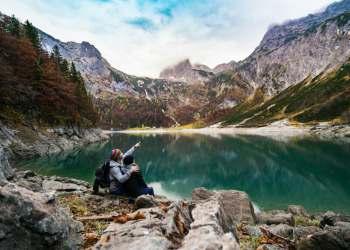Introduction
Traveling is an enriching and rewarding experience, but it often comes with a hefty price tag. From flights and accommodations to dining and activities, the costs can quickly add up, making it challenging to stick to your travel budget. However, with a bit of planning and savvy decision-making, it’s possible to stretch your travel budget and make the most of your adventures without breaking the bank. In this guide, we’ll explore some insider tips and money-saving hacks to help you save money while traveling.
Planning and Research
Before embarking on your journey, it’s essential to set a realistic budget and conduct thorough research. Start by determining how much you can afford to spend on your trip, taking into account factors such as transportation, accommodations, meals, and activities. Once you have a budget in mind, research destinations that offer lower costs of living and travel expenses, such as countries with favorable exchange rates or off-the-beaten-path destinations that are less touristy. Additionally, utilize budgeting tools and apps to track your expenses and stay within your budget throughout your trip.
Booking Flights and Accommodations
One of the most significant expenses of any trip is transportation and accommodations. To save money on flights, consider being flexible with your travel dates and booking tickets during off-peak times when fares are typically lower. Use price comparison websites to compare fares across multiple airlines and look for budget airlines that offer discounted fares. Similarly, when booking accommodations, opt for alternative options such as hostels, guesthouses, or vacation rentals, which are often cheaper than traditional hotels.
Packing Smart
Packing light can not only save you money on baggage fees but also make your travels more convenient and enjoyable. Bring only the essentials and pack versatile clothing and gear that can be worn in multiple settings and climates. Additionally, bring reusable items such as water bottles, utensils, and shopping bags to avoid having to purchase disposable items while traveling.
Eating and Dining
Eating out can quickly drain your travel budget, so it’s essential to be mindful of your dining expenses while traveling. Instead of dining at restaurants for every meal, explore local markets and street food vendors to sample delicious and affordable cuisine. Consider cooking your meals using local ingredients, especially if you have access to kitchen facilities in your accommodations. Take advantage of complimentary hotel breakfasts to start your day off on the right foot without spending extra money.
Transportation and Getting Around
Transportation expenses can add up quickly, especially if you rely on taxis or ride-sharing services for getting around. Instead, use public transportation whenever possible, such as buses, trains, or trams, which are often more affordable and convenient than taxis. For shorter distances, consider walking or biking, which not only saves money but also allows you to explore your surroundings at a leisurely pace.
Sightseeing and Attractions
Exploring attractions and sightseeing tours can be costly, but there are plenty of ways to save money while still enjoying everything your destination has to offer. Research free and discounted attractions in advance, such as museums with free admission days or outdoor parks and gardens. Consider purchasing city passes or discount cards, which offer discounted entry to multiple attractions and activities.
Budget-Friendly Activities
There are countless budget-friendly activities to enjoy while traveling, from hiking and picnicking in nature to attending free festivals and events. Take advantage of free outdoor activities such as hiking, swimming, or birdwatching, which allow you to experience the beauty of your destination without spending a dime. Look for cultural events and celebrations that are free to attend, such as street fairs, parades, or concerts.
Avoiding Tourist Traps
Tourist areas are often filled with overpriced souvenirs, restaurants, and attractions designed to cater to tourists. To save money, steer clear of these tourist traps and seek out authentic experiences off the beaten path. Explore local neighborhoods, markets, and eateries where locals frequent, and don’t be afraid to venture away from the main tourist areas to discover hidden gems.
Currency Exchange and Fees
When traveling abroad, be mindful of currency exchange rates and fees that can eat into your budget. Use credit cards that offer no foreign transaction fees when making purchases overseas, and avoid exchanging currency at airports or tourist areas, where rates are typically higher. Instead, use local banks or ATMs to withdraw cash at favorable rates and minimize ATM fees.
Traveling Off-Season
Traveling during off-peak times can offer significant savings on accommodations, transportation, and attractions. Research destination-specific off-seasons and take advantage of lower prices and fewer crowds. Not only will you save money, but you’ll also enjoy a more relaxed and authentic travel experience without the crowds of peak tourist seasons.
Staying Flexible
Flexibility is key to saving money while traveling, so be open to last-minute deals and opportunities that may arise. Keep an eye out for discounted flights, accommodations, and activities, and be willing to adjust your travel plans accordingly. Embrace spontaneity and adventure, and don’t be afraid to deviate from your itinerary if it means saving money or experiencing something new and unexpected.
Cultural Immersion on a Budget
Immersing yourself in the local culture is an essential part of the travel experience, and it doesn’t have to break the bank. Engage with locals to learn about their customs, traditions, and way of life, and seek out free or low-cost cultural activities and events. Participate in community events, volunteer opportunities, or language exchanges to connect with locals and gain a deeper understanding of your destination.
Managing Expenses on the Road
Throughout your travels, it’s essential to keep track of your expenses and stay within your budget. Use budgeting apps or spreadsheets to monitor your spending and identify areas where you can cut costs. Prioritize your spending on experiences and activities that align with your interests and values, and avoid unnecessary expenses on items or souvenirs that won’t add value to your trip.
Conclusion
Traveling on a budget doesn’t mean sacrificing quality or missing out on memorable experiences. By implementing these money-saving hacks and insider tips, you can stretch your travel budget further and enjoy incredible adventures without breaking the bank. From booking affordable accommodations to exploring free attractions and activities, there are endless opportunities to save money and make the most of your travels.

FAQs:
- Q: Can I really travel on a shoestring budget?
- A: Yes, with careful planning and budgeting, it’s possible to travel on a shoestring budget and still have an amazing experience.
- Q: What are some of the best ways to save money while traveling?
- A: Some of the best ways to save money include booking flights and accommodations in advance, cooking your meals, and taking advantage of free activities and attractions.
- Q: Are budget accommodations safe and comfortable?
- A: Yes, many budget accommodations such as hostels and guesthouses offer clean, safe, and comfortable accommodations at affordable prices.
- Q: How can I avoid overspending while traveling?
- A: To avoid overspending, set a realistic budget, track your expenses, and prioritize spending on experiences that are meaningful to you.
- Q: Is it possible to travel without a lot of money?
- A: Yes, it’s possible to travel on a tight budget by being resourceful, flexible, and mindful of your spending habits. With careful planning and smart decision-making, you can enjoy incredible adventures without breaking the bank.





